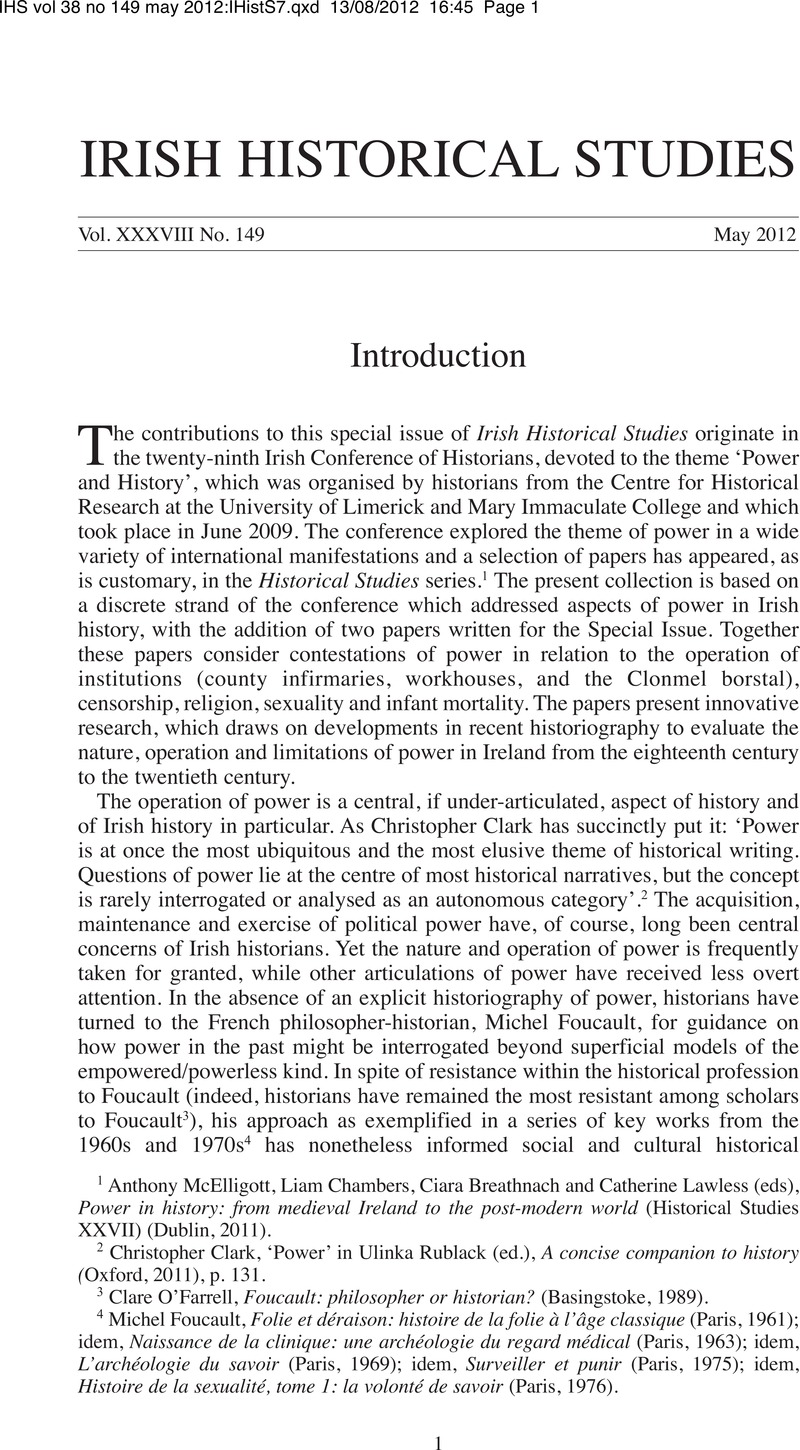No CrossRef data available.
Published online by Cambridge University Press: 04 February 2015

1 McElligott, Anthony, Chambers, Liam, Breathnach, Ciara and Lawless, Catherine (eds), Power in history: from medieval Ireland to the post-modern world (Historical Studies 27) (Dublin, 2011).Google Scholar
2 Clark, Christopher, ‘Power’ in Rublack, Ulinka (ed.), A concise companion to history (Oxford, 2011), p.131.Google Scholar
3 O’Farrell, Clare, Foucault: philosopher or historian? (Basingstoke, 1989).CrossRefGoogle Scholar
4 Foucault, Michel, Folie et déraison: histoire de la folie à l’âge classique (Paris, 1961);Google Scholar idem, Naissance de la clinique: une archéologie du regard médical (Paris, 1963); idem, L’archéologie du savoir (Paris, 1969); idem, Surveiller et punir (Paris, 1975); idem, Histoire de la sexualité, tome 1: la volonté de savoir (Paris, 1976).
5 Ignatieff, Michael, A just measure of pain: the penitentiary in the Industrial Revolution, 1750–1850 (Harmondsworth, 1989).Google Scholar
6 For a primer which introduces a range of theoretical approaches to power see Haugaard, Mark (ed.), Power: a reader (Manchester, 2002).Google Scholar
7 Foucault, Michel, Madness and civilization: a history of insanity in the age of reason (London, 2001), pp 35–60.Google Scholar
8 David, Dickson, ‘In search of the old Irish poor law’ in Mitchison, Rosalind and Roebuck, Peter (eds), Economy and society in Scotland and Ireland 1500–1939 (Edinburgh, 1988), pp 149–59.Google Scholar
9 For the developing historiography of early modern Irish medical history see Kelly, James and Clark, Fiona, ‘Introduction’ in Kelly, James and Clark, Fiona (eds), Ireland and medicine in the seventeenth and eighteenth centuries (Aldershot, 2010), pp 1–16.Google Scholar
10 McDowell, R.B., The Irish administration, 1801–1914 (London, 1964);Google ScholarFinnane, Mark, Insanity and the insane in post-Famine Ireland (London, 1981);Google ScholarCrossman, Virginia, Politics, pauperism and power in late nineteenth-century Ireland (Manchester, 2006).Google Scholar
11 Foucault, Michel, Discipline and punish: the birth of the prison (London, 1991), pp 135–70Google Scholar, 231–56.
12 Cox, Catherine, ‘Institutionalisation in Irish history and society’ in McAuliffe, Mary, O’Donnell, Katherine and Lane, Leeann (eds), Palgrave advances in Irish history (Basingstoke, 2009), pp 169–90.CrossRefGoogle Scholar
13 The authors draw on ongoing research: Gray, Peter, The making of the Irish Poor Law 1815—43 (Manchester, 2009);Google ScholarReidy, Conor, Ireland’s 'moral hospital’: the Irish borstal system, 1906–1956 (Dublin, 2009).Google Scholar
14 For censorship in a later period: Drisceóil, Dónal Ó, Censorship in Ireland, 1939–1945: neutrality, politics and society (Cork, 1996).Google Scholar
15 Related work includes: Luddy, Maria, Prostitution and Irish society, 1800–1940 (Cambridge, 2007);Google ScholarRiordan, Susannah, ‘Venereal disease in the Irish Free State: the politics of public health’ in Irish Historical Studies, 35, no. 139 (May, 2007), pp 345–64;CrossRefGoogle ScholarFerriter, Diarmaid, Occasions of sin: sex and society in modern Ireland (London, 2009).Google Scholar
16 For related issues: Walsh, John, The politics of expansion: the transformation of educational policy in the Republic of Ireland, 1957–72 (Manchester, 2009).Google Scholar
17 On the application of Foucault’s ideas to the history of Irish sexuality, see Inglis, Tom, ‘Origins and legacies of Irish prudery: sexuality and social control in modern Ireland’ in Eire-Ireland, 11, no. 3/4 (fall/winter 2005), pp 9–37;CrossRefGoogle Scholar idem, ‘Foucault, Bourdieu and the field of Irish sexuality’ in Irish Journal of Sociology, vii (1997), pp 5–28.